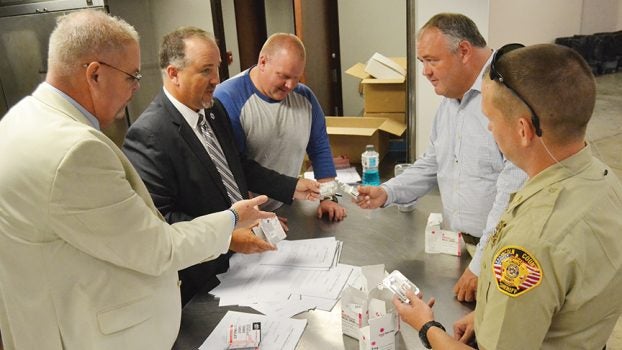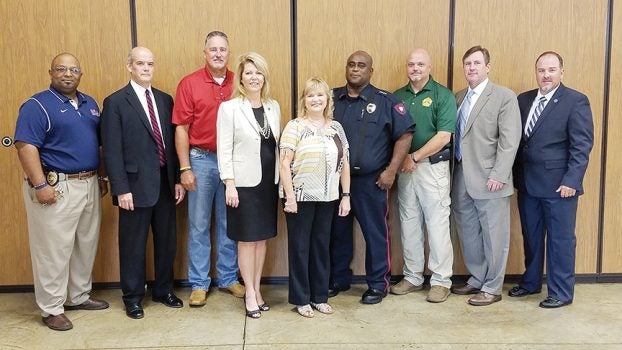Judge Taylor: It’s about saving their lives — Area officers among first to receive overdose-combating meds
Published 9:46 pm Friday, August 4, 2017
Law enforcement officers in Brookhaven and Lincoln County are some of the first in the state to carry a life-saving drug that can reverse the effects of opioid overdoses.
Police officers and deputies trained alongside other first responders from Pike and Walthall counties to learn when and how to use the naloxone nasal spray, which goes by the brand name Narcan.
Every officer who received training this week will be issued a single dose of the Narcan spray to carry at all times. The training and medicine were made available through a partnership with the state Departments of Mental Health and Public Safety. This effort was funded by the State Targeted Response to the Opioid Crisis Grant, as part of the 21st Century Cures Act and is consistent with the final recommendations made by the Governor’s Opioid and Heroin Study Task Force.
The state received a $3.58 million grant May 1.
Lincoln, Pike and Walthall counties were the first to be offered the training and Narcan. A single dose of the medicine is $37.50 through a state contract.
Naloxone is a medication that can block or reverse the effects of opioids, particularly in an overdose situation. While there are no adverse effects to administering naloxone to someone in distress, it is important to note that its use is not a substitute for emergency medical care, which should be administered as soon as possible after a suspected overdose or use of naloxone.
“In Mississippi, about one out of every 10 people misuses prescription drugs in some way,” said Michael Jordan, director of the DMH Bureau of Alcohol and Drug Services and State Opioid Treatment Authority. “The abuse of prescription drugs has led to a surge in opioid and heroin addiction, and this is an issue that is costing people their lives.”
The number of prescriptions for painkillers filled in Lincoln County last year was greater than the population.
John Dowdy, director of the Mississippi Bureau of Narcotics, said in 2016, the estimated population of Lincoln County was 34,523. In that same year, there were 40,732 prescriptions filled for opioids.
Opioids are a family of painkillers that work on the nervous system, drugs like morphine, fentanyl, oxycodone, hydrocodone and even heroin. According to the Center for Disesase Control, Fentanyl is a synthetic opioid pain reliever. It is many times more powerful than other opioids and is approved for treating severe pain, typically advanced cancer pain.
“Opiod overdose deaths are out of control over the country and Mississippi is no exception,” Lincoln County Circuit Court Judge Michael Taylor said. “We’ve seen over the last 15, 20 years an increasing problem with prescription drug abuse of all kinds, especially opioid.”
Taylor said it’s important that law enforcement carry the medicine so that it can be administered quickly.
“By getting it in the hands of first responders, deputies and policemen, we have a better chance of saving lives. It’s not enabling people to use opioids. It’s about saving their lives.”
John Douglas, drug court coordinator for the 14th Circuit Court District and a former narcotics agent, said opioid abuse is on the rise and it can be a threat to officers who must search for the drugs.
Since prescription opioids are usually prescribed as a transdermal patch, an officer can come in contact with the drug accidentally during a search.
Having the Narcan available could also save a first reponder’s life.
An accidental overdose of an opiod by an officer hasn’t happened in Lincoln County, but it could, Brookhaven Police Chief Kenneth Collins said.
“We would like to thank the Mississippi Mental Health and also the 14th District Drug Court for helping us to not just enforce the law but to protect and serve the communities that we love so much,” he said at Friday’s training session. “This is just another tool in saving lives. We do more than just enforce the laws. We also serve the community. We want to thank them for putting on a good class and training to enable us to save lives, maybe our own.”
Sheriff Steve Rushing sent his deputies for training in Pike County Thursday and Friday so they can carry the medicine.
“It’s another step for us to help the public,” he said. “It’s getting to the point where it’s getting right there with CPR and other medical issues we get trained in. This is just another step when we’re first on the scene.”
After law enforcement officers use the Narcan to possibly save someone’s life after an overdose, then what?
The officers follow up with a full report, Douglas said.
The report comes to his office and drug court officials can then identify who is likely abusing opiods and they can intervene and offer resources to the person.
There could also be criminal charges if there is illegal drug use involved, he said.
Law enforcement officers are not the only ones who can administer the medicine.
House Bill 996, passed in Mississippi’s 2017 legislative session, permits the use of standing orders for naloxone at pharmacies across the state. These standing orders allow any individual to request to purchase naloxone at a pharmacy without a doctor’s prescription.
“We passed a bill in the Legislature that first responders and law officers could give the nasal spray Narcan on the scene and not be sued,” said Rep. Becky Currie, R-Brookhaven. “Giving the Narcan cannot hurt anyone, it could only save lives. This was a great step and thanks to our local Judges Mike Taylor and David Strong our area was first to receive the grants to begin this program.”
Sen. Sally Doty, R-Brookhaven, also saw the importance of the bill.
“My friend, Sen. Rita Parks, from Corinth, had filed a companion bill in the Senate that was never taken up in committee so it was dead. When the House bill came over to the Senate, Sen. Parks and I met with Lt. Gov. (Tate) Reeves to stress the importance of this program,” she said. “I then presented the bill in committee and also handled it on the Senate floor.”






